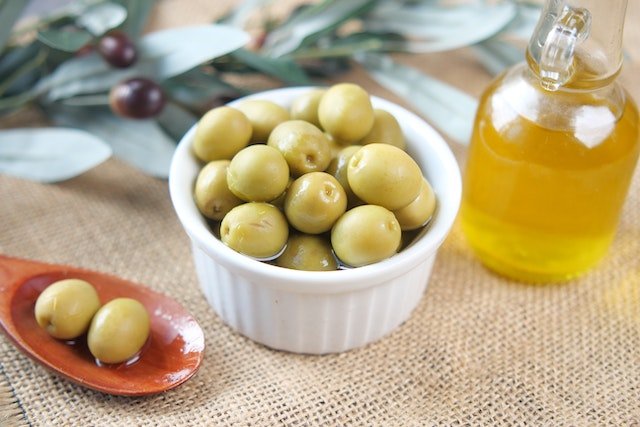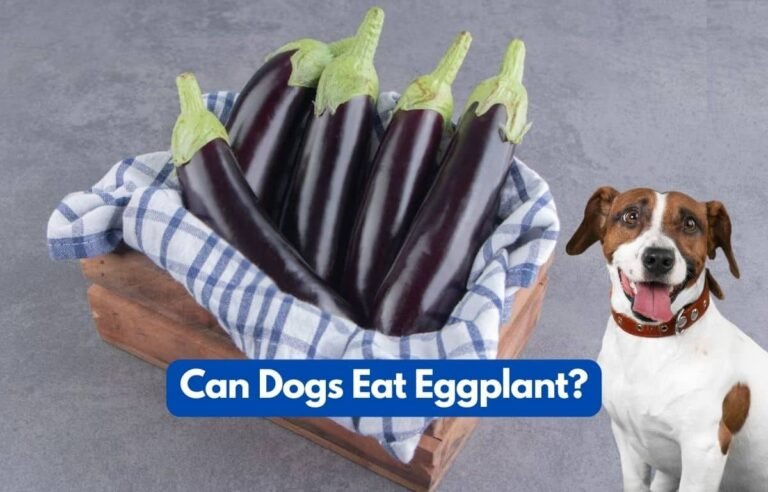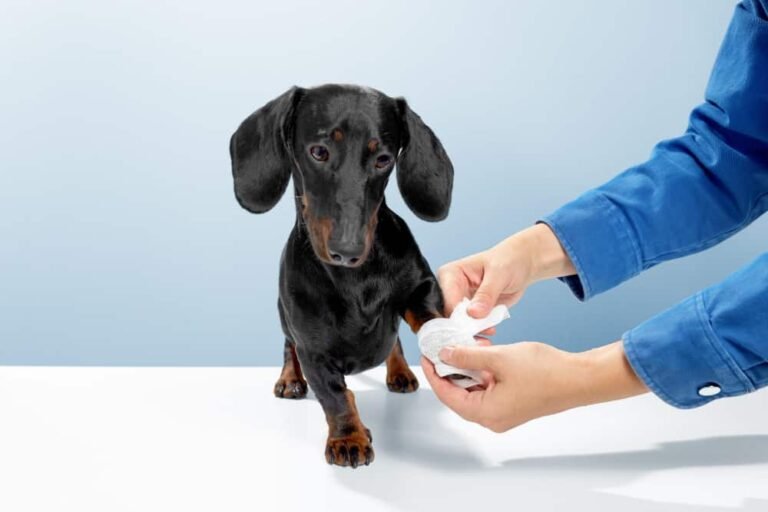Can Dogs Eat Olives? The Ultimate Guide

Today, we embark on an exciting quest to uncover the truth about a flavorful treat—olives! Can dogs eat olives? Have you ever wondered if those small, briny orbs can make their way into your furry friend’s diet? Well, fear not, for we shall unveil the answers you seek.
Whether you’re a new or existing dog owner, it’s essential to be aware of what foods are safe and beneficial for your four-legged companion. Olives can be a tempting treat, but it’s crucial to understand the potential risks and benefits they pose to your pup’s health.
That’s why in this blog post, we’ll explore the nutritional benefits, potential risks, and best practices when feeding olives to dogs. In the end, you will get enough information to help you ensure your dogs’ well-being. So, let’s get started!
Can Dogs Eat Olives?
Yes, dogs can eat olives however, it has to be in moderation. Also, it’s important to consider a few factors before including them in your pet’s diet.
For instance, olives are low in calories and contain healthy fats, making them a nutritious snack option for dogs. However, they should be given sparingly due to their high sodium content, which can be detrimental to canine health. Additionally, pits and any added seasonings must be removed, as they can pose choking hazards or cause digestive issues.
It’s always wise to introduce new foods gradually and monitor your dog for any adverse reactions. If you need more clarification about feeding olives to your furry friend, consult with your veterinarian to ensure it aligns with your dog’s specific dietary needs.
Also, read: Can Dogs Eat Frozen Yogurt? Unveiling the Truth

Can puppies have Olives?
Yes, puppies can have olives, but it’s important to exercise caution and moderation. While olives are generally safe for puppies to eat, their digestive systems are still developing, and certain precautions should be taken.
Firstly, you need to introduce olives gradually into their diet and monitor for any signs of digestive upset or allergies. Also, remember to remove pits and any added seasonings before offering olives to your puppy, as these can present choking hazards or cause stomach discomfort.
It’s also crucial to consult with your veterinarian about incorporating olives into your puppy’s diet, as they can provide guidance based on your puppy’s specific needs and health considerations. Always prioritize your puppy’s well-being and consult with professionals when in doubt.
Types of Olives, Can Dogs Them?
In this section, we will explore different types of olives and whether they are suitable for dogs to consume. Let’s dive into each type and find out!
1. Black Olives
Black olives are generally safe for dogs to eat. They have a milder flavor and can be a tasty treat for your canine companion. However, remember to remove pits and serve them in moderation.
2. Green Olives
Green olives can also be given to dogs in moderation. However, it’s important to ensure that they are not marinated or seasoned with any harmful ingredients. Stick to plain green olives without additives.
3. Greek Olives
Greek olives, including Kalamata olives, can be given to dogs in moderation. These olives should be free of seasoning or additional additives that might be harmful to your furry friend’s health.
4. Manzanilla Olives
Manzanilla olives, whether stuffed or plain, can be offered to dogs as an occasional treat. However, be mindful of the stuffing ingredients if they are stuffed olives. Stick to plain Manzanilla olives to be on the safe side.
5. Whole Olives
As long as you remove the pits and serve them in moderation, dogs can enjoy whole olives. Remember that the pit can pose a choking hazard and should always be removed before giving olives to your dog.
6. Olives From the Tree
While dogs can technically eat olives straight from the tree, it’s important to consider the potential presence of pesticides or other chemicals. It’s best to stick to olives that have been properly harvested, processed, and prepared for human consumption.
7. Raw Olives
Raw olives are safe for dogs to consume, as long as they are properly prepared and served in moderation. Raw olives should be washed and free of any harmful substances.
8. Ripe Olives
Ripe olives are safe for dogs to eat, but as with any other type of olives, they should be served in moderation. Ripe olives have a different flavor profile compared to unripe ones and can be enjoyed by your furry friend as an occasional treat.
9. Canned Olives
Canned olives can be given to dogs, but it’s essential to choose varieties that are packed in water or brine, without added salt or seasonings. Always check the label to ensure there are no harmful additives.
10. Cooked Olives
Cooked olives are generally safe for dogs, but it’s important to consider the cooking method and any additional ingredients used. Avoid olives cooked in oils or seasoned with potentially harmful spices or herbs.
11. Olive Juice
While small amounts of olive juice are unlikely to cause harm to dogs, it’s best to avoid giving them olive juice. The high sodium content in olive juice can be detrimental to a dog’s health, especially if consumed in excess.
12. Dry Olives
Dry olives, also known as dehydrated olives, are safe for dogs to eat. However, ensure they are plain and free of any seasoning or additives that may be harmful to your pet.
13. Fried Olives
Fried olives should be avoided when it comes to feeding dogs. The frying process often involves oil and seasonings that can be harmful to dogs, particularly the oil used for frying.
14. Olives in Brine
Olives in brine can be given to dogs, provided they are plain and do not contain excessive salt or seasonings. It’s crucial to read the label and choose olives packed in brine without any harmful additives.
15. Pickled Olives
Pickled olives are not recommended for dogs. The pickling process involves vinegar and other ingredients that may not be suitable for your furry friend’s digestive system. Stick to plain, non-pickled olives instead.
16. Pimento Olives
Pimento olives, which have red pepper stuffing, should be avoided for dogs. The stuffing ingredients and potential seasonings may not be safe for their consumption. Stick to plain olives without any stuffing.
17. Olive Pits
Olive pits should never be given to dogs. They pose a choking hazard and can cause blockages in the digestive system if ingested. Always remove pits before serving olives to your dog.
18. Olive Branches and Leaves
While dogs may chew on olive branches or leaves, it’s important to discourage this behavior. Olive branches and leaves can be potentially toxic to dogs if ingested in large quantities. Monitor your dog to ensure they do not consume these parts of the olive tree.
Also read about the 6 Reasons Why Your Dog Should Be Eating Sauerkraut Right Now
Health Benefits of Olives For Dogs
Olives can offer several health benefits for dogs when incorporated into their diet in moderation. Here are some potential advantages:
- Nutritional Value: Olives are rich in healthy fats, vitamins, and minerals, such as vitamin E, iron, and calcium. These nutrients support overall well-being and contribute to a balanced diet.
- Antioxidant Properties: Olives contain antioxidants that help protect against cell damage caused by free radicals. This can aid in reducing the risk of chronic diseases and support a healthy immune system in dogs.
- Healthy Fats: The monounsaturated fats found in olives can contribute to a shiny coat and healthy skin in dogs. They also provide a source of energy and support proper brain function.
- Fiber Content: Olives contain dietary fiber, which can aid in digestion and promote regular bowel movements in dogs.

Risks of Giving Dogs Olives
While olives can have potential health benefits for dogs, there are also risks associated with giving them to your furry friend. Here are some important considerations:
- High Sodium Content: Olives, especially those that are brined or seasoned, can be high in sodium. Excessive sodium intake can lead to dehydration, and electrolyte imbalances, and potentially harm your dog’s cardiovascular health. It’s crucial to offer olives in moderation and choose low-sodium options whenever possible.
- Choking Hazards: The pits found in olives can pose a significant choking hazard for dogs. Always ensure that olives are pitted and thoroughly checked before giving them to your pet.
- Digestive Upset: Some dogs may experience digestive issues such as upset stomach, diarrhea, or vomiting after consuming olives. This can be due to the high fat content or individual sensitivity. Monitor your dog’s reaction and consult your veterinarian if any adverse symptoms occur.
- Allergies or Sensitivities: Dogs, like humans, can have allergies or sensitivities to certain foods. If you notice any signs of an allergic reaction, such as itching, swelling, or difficulty breathing, discontinue feeding olives and seek veterinary assistance.
When to Start Giving Dogs Olives
When it comes to introducing olives to your dog’s diet, it’s essential to consider their age and overall health. Here are some guidelines to follow:
- Adult Dogs: Olives can typically be introduced to adult dogs who have no known allergies or health conditions. It’s important to start with small amounts and observe their reaction. If your dog shows any signs of digestive upset or allergies, it’s best to avoid giving them olives.
- Puppies: Puppies have more sensitive digestive systems, so it’s generally recommended to wait until they are at least six months old before introducing olives. Even then, it’s crucial to start with small quantities and monitor for any adverse reactions.
- Dogs With Health Conditions: If your dog has any underlying health conditions, such as pancreatitis or kidney disease, it’s best to consult with your veterinarian before introducing olives or any new food. Some health conditions may require dietary restrictions or specific recommendations that may affect whether olives are suitable.
Alternatives to Olives for Dogs
If you’re looking for alternative snacks for your dog, there are several safe and healthy options to consider. Here are some alternatives to olives:
- Carrots: Carrots are low in calories and high in fiber, making them a great crunchy snack for dogs. They are also rich in vitamins and promote dental health.
- Blueberries: Packed with antioxidants, blueberries are a tasty and nutritious treat for dogs. They are low in calories and high in vitamins, minerals, and fiber.
- Green Beans: Green beans are a healthy and low-calorie snack option for dogs. They provide a good source of fiber and vitamins while being low in fat.
- Pumpkin: Plain, cooked pumpkin (not the sweetened pie filling) can be a beneficial addition to your dog’s diet. It is high in fiber and can help with digestive regularity.
- Apples: Apples, sliced and without seeds or the core, can serve as a refreshing and crunchy treat for dogs. They are a good source of vitamins and fiber.
Conclusion
In conclusion, the question of whether dogs can eat olives may not have a definitive answer. While olives can be enjoyed by dogs as an occasional treat, there are considerations to keep in mind. For instance, remove pits, choose plain varieties without harmful additives, and serve them in moderation.
Note that every dog is unique, and what works for one may not work for another. As responsible pet owners, we must pay attention to our furry friends’ individual needs and consult with our veterinarians. So, next time you’re snacking on olives, you can share a small piece with your dog, but always remember to prioritize their health and happiness above all.





